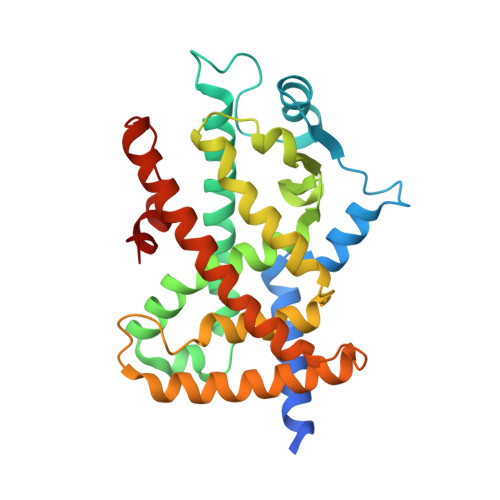Synthesis, characterization and biological evaluation of ureidofibrate-like derivatives endowed with peroxisome proliferator-activated receptor activity.
Porcelli, L., Gilardi, F., Laghezza, A., Piemontese, L., Mitro, N., Azzariti, A., Altieri, F., Cervoni, L., Fracchiolla, G., Giudici, M., Guerrini, U., Lavecchia, A., Montanari, R., Di Giovanni, C., Paradiso, A., Pochetti, G., Simone, G.M., Tortorella, P., Crestani, M., Loiodice, F.(2012) J Med Chem 55: 37-54
- PubMed: 22081932
- DOI: https://doi.org/10.1021/jm201306q
- Primary Citation of Related Structures:
3R8I - PubMed Abstract:
A series of ureidofibrate-like derivatives was prepared and assayed for their PPAR functional activity. A calorimetric approach was used to characterize PPARγ-ligand interactions, and docking experiments and X-ray studies were performed to explain the observed potency and efficacy. R-1 and S-1 were selected to evaluate several aspects of their biological activity. In an adipogenic assay, both enantiomers increased the expression of PPARγ target genes and promoted the differentiation of 3T3-L1 fibroblasts to adipocytes. In vivo administration of these compounds to insulin resistant C57Bl/6J mice fed a high fat diet reduced visceral fat content and body weight. Examination of different metabolic parameters showed that R-1 and S-1 are insulin sensitizers. Notably, they also enhanced the expression of hepatic PPARα target genes indicating that their in vivo effects stemmed from an activation of both PPARα and γ. Finally, the capability of R-1 and S-1 to inhibit cellular proliferation in colon cancer cell lines was also evaluated.
Organizational Affiliation:
Laboratorio di Oncologia Sperimentale Clinica, Istituto Tumori "Giovanni Paolo II", 70124 Bari, Italy.















